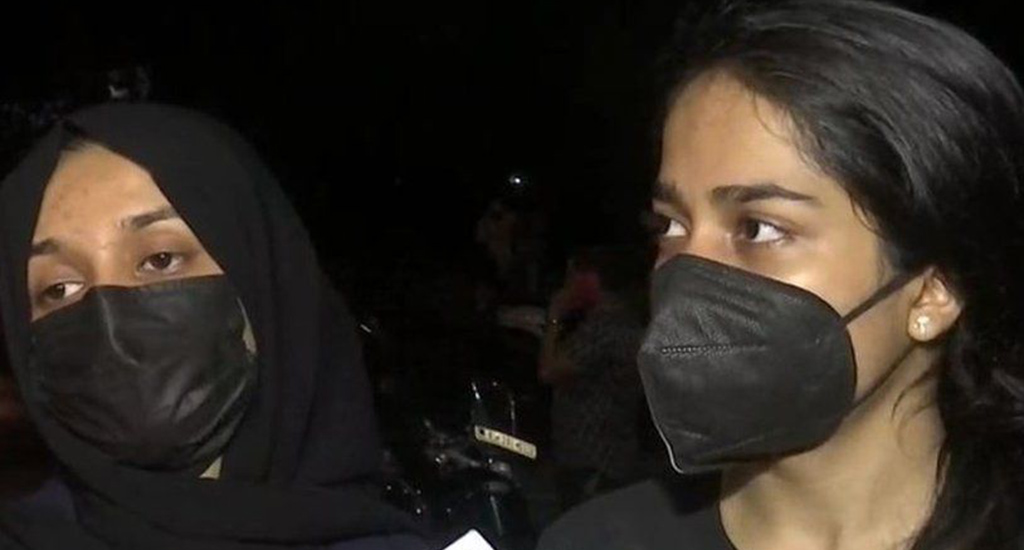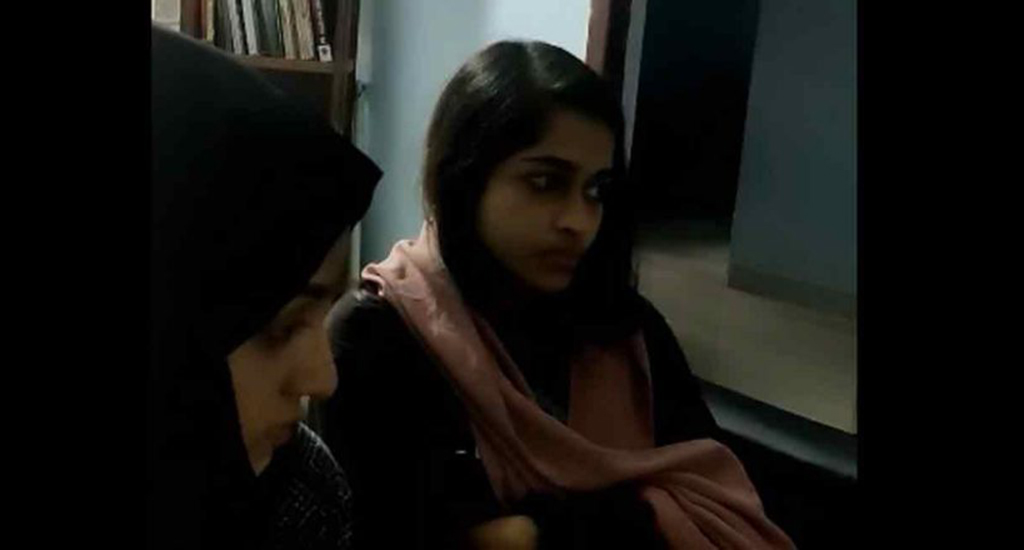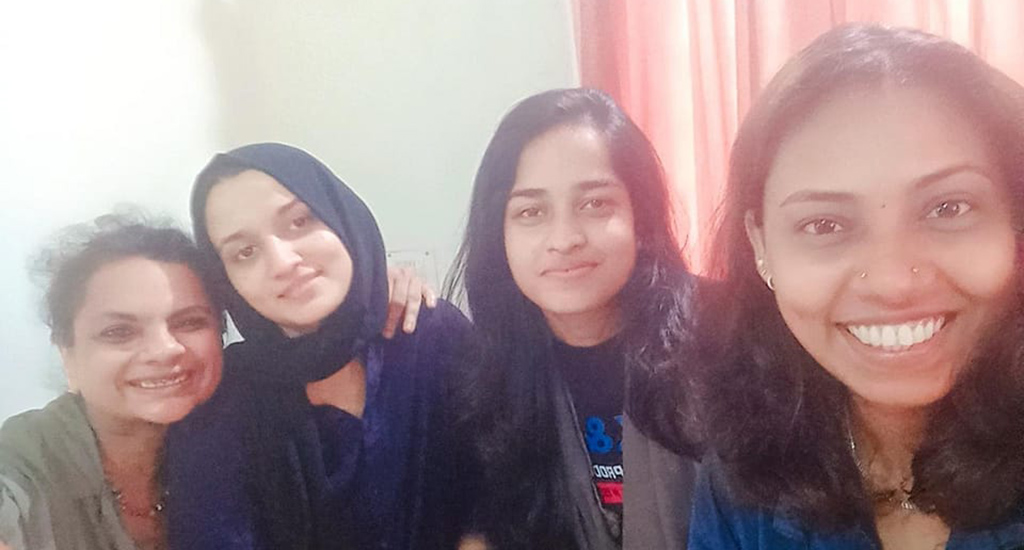
Court unites lesbian couple separated by family
A young lesbian couple, forcibly separated by their families and reunited thanks to a court intervention, are filled with hope, though bracing themselves for a tough future.

A young lesbian couple, forcibly separated by their families and reunited thanks to a court intervention, are filled with hope, though bracing themselves for a tough future.
It was a tense and nerve-wracking moment for Adhila Nassrin and Fathima Noora as they awaited the court’s verdict.
Will the court approve of their same-sex relationship and let the two young women live with each other?
Besides each other, the two women only had the support of the organisation that had given them shelter. They had no support from their families. In fact, it was because of Noora’s family and their intentions to separate them that Nassrin approached the court.
And when the Kerala High Court’s Kochi division bench of Justice K Vinod Chandran and Justice C Jayachandran allowed Nassrin’s habeas corpus plea on 31 May and announced, “We were of the opinion that both should be left to live their lives as per their informed choice. We find no reason to hold them back,” it was a huge relief for Nassrin and Noora.
Twenty-two-year-old Adhila Nassrin knew that her 23-year-old partner Fathima Noora was being held at home against her will.
Nassrin hails from Aluva in the Ernakulum district and Noora from Thamaraserry in the Kozhikode district. But both grew up in Saudi Arabia and were friends since their school days.
Their families were also friends with each other. The families, in fact, were so close they went together on trips, shopped together and often had jubilant get-togethers.
As the families became closer, the friendship between Nassrin and Noora blossomed into romance.

When the families learnt of this they forcibly sent the girls back to their respective villages in India. According to the girls, most of the family members also returned to keep tabs on them.
Nassrin and Noora had to go through verbal and physical abuse at home, because of their sexual orientation.
In a 2018 landmark judgement the Supreme Court decriminalised all kinds of adult consensual sex behaviour. But many still think that same-sex relationship is a mental ailment that needs treatment and not legal intervention.
There have been media reports of ‘conversion therapy’ subjecting queer people to various forms of treatment.
Similarly, the young women’s families had subjected them to constant advice and counselling sessions.
“Being homosexual or lesbian is a result of various biological and psychological factors including hormone formation, genital variations and sexual experiences during childhood. Sex can’t be structured in a monolithic mode,” said Arun B Nair, consultant psychiatrist of Government Medical College, Thiruvananthapuram.
“Hence society should have a scientific as well as humanitarian approach towards people like Adhila and Fathima.”
For three-and-a-half years, the young women could not meet each other.
Then on 19 May, at 4 am, with just a small bag of essentials, Fathima Noora started a tedious journey to find Nassrin. She finally found Nassrin at the office of Vanaja Collective, a Kozhikode-based NGO working for the marginalised people.
“I can’t explain the happiness I felt when I met Adhila after an aching gap of three-and-a-half years,” recollected Noora.

Gargi Harithakam of the Vanaja Collective brought together both the families and tried to help them reach an amicable settlement.
Despite police intervention, both the families were unrelenting. After chaotic scenes at the police station, the women were forcefully separated again and taken to different towns.
Again they had to endure physical and emotional assaults.
“Despite the law being with the lesbian couple, we struggled to unite them,” said Gargi Harithakam. “We had no option but to approach the court.”
Danya Ravindran, a social activist at Kochi coordinated the legal formalities. Then K R Aneesh, an advocate, filed the habeas corpus petition on behalf of Nassrin, requesting that Noora be produced in court, as her family was forcibly keeping her in custody.
After getting a court order, on 31 May the police produced Noora before the court. And she unequivocally pleaded to be united with Nassrin.
“We were emotionally drained. With the court order we are now free and feel relieved,” said Nassrin, while thanking those who supported them.
We were emotionally drained. With the court order we are now free and feel relieved.”
After the high court verdict, more youngsters may be emboldened to follow the duo’s footsteps, annulling the so-called moral, ethical and religious ethos.
“We too need help” – is a frequent request that Vanaja Collective receives nowadays.
Now that the court has united the couple, “I can’t explain the depth of love. We’ve pledged to be together till the last breath,” Noora told Village Square.
Even after winning the battle, the families of Nassrin and Noora have not reconciled.
In India, as in most parts of the world, life has not been easy for the people of the lesbian, gay, bisexual, transgender and queer (LGBTQ) community. Then Section 377 of Indian Penal Code – which made homosexuality a punishable offence – was repealed in 2018. It helped many of the queer community come out.
But many in a same-sex relationship still face stigma. For Nassrin and Noora, their orthodox background made acceptance tougher.
“After intervening for Adhila and Fathima, we’re getting many threats,” said Gargi Harithakam.

There are laws for the protection and welfare of the transgenders.
But there is nothing specifically for same-sex partners, though they are categorised as a marginalised group.
“There’s no need for any special law. Existing laws are enough. But they should be implemented strictly,” K R Aneesh told Village Square. “The Kerala High Court judgement is an eye-opener that nothing can come between same-sex partners.”
But there are bound to be hardships.
“The court has vindicated their lesbian relationship. But they’ll face many obstacles in the future,” Gargi Harithakam told Village Square.
Nassrin and Noora are graduates in English. They take up possible online jobs for their basic needs, though there is no job guarantee.
“My parents were not bothered about my studies or career. Instead, they preferred to marry me off at the earliest,” said Nassrin.
But Nassrin is confident that they will find a foothold, find good jobs and earn. And that their love would be their driving spirit.
K Rajendran is a journalist based at Thiruvananthapuram.